In Japan, it seems like there are only 2 groups in the world: Japanese people and foreigners (meaning the USA!) But this is not the case. Whilst I was living in Japan, I could see this emphasis on the USA on many occasions when I heard Japanese people saying ‘foreigners’ have blond hair and blue eyes. However, this only describes a small group of people of European origin, many of whom live in the USA. Chinese people also fall into the category of ‘foreigner’ but they don’t have blond hair or blue eyes. In fact, because they are also East Asians, they look just like Japanese people!
日本では、世界をたった2つのグル-プに分けてしまっているようです:日本人と外国人(それが意味するのはアメリカ合衆国!)というグループです。けれども、そんなことはありません。日本に住んでいた間、日本の人々が「外国人」は金髪で青い目をしていると言うのを聞く場面が何度もあったので、私はこのアメリカ合衆国に対する重視に気付くことができました。しかしながら、これは単にヨーロッパを起源とする人々の一つの小さなグループのことを述べているにすぎず、その多くがアメリカに住んでいるのです。中国人もまた「外国人」の範疇に入っていますが、金髪でもなければ、青い目もしていません。実際、彼らも東アジア人なので、日本人に似ていますね!
Maybe many people generalise like this because Japan’s population is mainly a mono-racial society, so they also see outsiders in only one way. Furthermore, a legacy of Japan’s limited historical interaction with other cultures and ethnicities during the Sakoku period spanning the 1600-1800s, which was justifiably aimed at keeping out European imperialistic ambitions and preserving national identity, might still influence this contemporary narrow definition of a foreigner. However, in contemporary times, remember it is always what’s inside that counts, not what is outside.
日本の人口の大部分を単一民族が占めているため、このように多くの日本人が外部の人々をも画一的に捉えてしまうのかもしれません。さらに、他の文化や民族との交流が限られていた1600年代から1800年代の鎖国時代の遺産、それは欧州帝国主義の野望を排除し国家のアイデンティティを守ることが目的であると正当化されたのですが、その遺産がいまだに外国人に対する現在の狭義な定義に影響を与えているのかもしれません。しかし、大切なのは外面ではなく内面である、ということを忘れないでください。
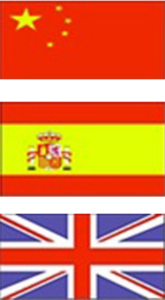 Further evidence of Japan’s emphasis on the USA is that the only foreign language taught in 99% of Japanese schools is English. The reason for this given by the Ministry of Education is that English is an international language which many people in the world speak. However, there are many other international languages which are spoken widely in several countries. In the order of the amount of native speakers, these include Mandarin Chinese, Spanish, English, Arabic and French. These languages (including Russian) are the international languages officially utilised by the United Nations. Other countries teach a range of these foreign languages in their schools, so why does Japan only concentrate on English?
Further evidence of Japan’s emphasis on the USA is that the only foreign language taught in 99% of Japanese schools is English. The reason for this given by the Ministry of Education is that English is an international language which many people in the world speak. However, there are many other international languages which are spoken widely in several countries. In the order of the amount of native speakers, these include Mandarin Chinese, Spanish, English, Arabic and French. These languages (including Russian) are the international languages officially utilised by the United Nations. Other countries teach a range of these foreign languages in their schools, so why does Japan only concentrate on English?
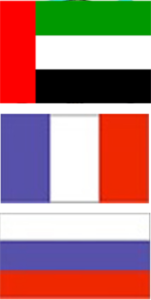 アメリカ合衆国に対する重視のさらなる証拠は、日本の学校の99%で教えられている唯一の外国語が英語であるということです。このことに関して、文部科学省があげている理由は、「英語は世界でたくさんの人々が話している国際語だ。」ということです。しかしながら、他にもたくさんの国際語があり、広くいろいろな国で話されています。母語話者数の多い順に並べると、北京語、スペイン語、英語、アラビア語、そして、フランス語となります。これらの言語(ロシア語も含めて)は、国連で公式に使用されている国際語です。他の国々では、学校でこの範囲に含まれる外国語のうちのいくつかを教えています。それなのに、どうして日本は英語にだけ集中するのでしょう
アメリカ合衆国に対する重視のさらなる証拠は、日本の学校の99%で教えられている唯一の外国語が英語であるということです。このことに関して、文部科学省があげている理由は、「英語は世界でたくさんの人々が話している国際語だ。」ということです。しかしながら、他にもたくさんの国際語があり、広くいろいろな国で話されています。母語話者数の多い順に並べると、北京語、スペイン語、英語、アラビア語、そして、フランス語となります。これらの言語(ロシア語も含めて)は、国連で公式に使用されている国際語です。他の国々では、学校でこの範囲に含まれる外国語のうちのいくつかを教えています。それなのに、どうして日本は英語にだけ集中するのでしょう
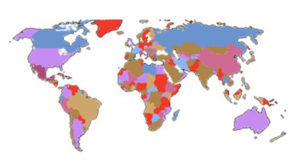
We live in a pluralistic world, thus it is a mistake to define all foreigners as only having the physical characteristics of a small group of Europeans. There are about 194 other countries in the world, not just the USA! They are all as different and as unique as Japan in their cultures and ways of life. So it makes no sense to put them all in one group!
私たちは多元的な世界に住んでいるのですから、全ての外国人を、一部のヨーロッパ系の人々のなかの身体的特徴を持つ小さなグループと決めつけるのは間違いです。世界にはアメリカ合衆国だけではなく、他にも約194の国々があるのです!どの国もみな違っていて、日本と同じくらい独特な、文化や生活様式があるのです。ですから、それらを全て一つのグループに入れてしまうのは、意味がありません!
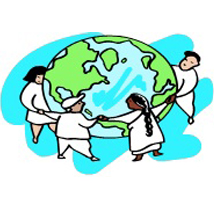 We must see each individual nationality for itself and appreciate the world for its diversity. Expand your horizons, and in discovering the various distinctions, I’m sure you will find great pleasure!
We must see each individual nationality for itself and appreciate the world for its diversity. Expand your horizons, and in discovering the various distinctions, I’m sure you will find great pleasure!
私たちはそれぞれ個々の国民性をあるがままに見て、世界の多様性に感謝しなければなりません。視野を広げ、様々な特性を発見していくなかで、皆さんは、大きな喜びを見い出すに
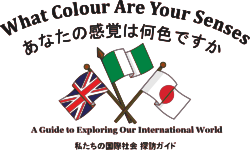
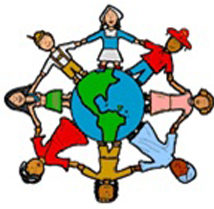


 アメリカ合衆国に対する重視のさらなる証拠は、日本の学校の99%で教えられている唯一の外国語が英語であるということです。このことに関して、文部科学省があげている理由は、「英語は世界でたくさんの人々が話している国際語だ。」ということです。しかしながら、他にもたくさんの国際語があり、広くいろいろな国で話されています。母語話者数の多い順に並べると、北
アメリカ合衆国に対する重視のさらなる証拠は、日本の学校の99%で教えられている唯一の外国語が英語であるということです。このことに関して、文部科学省があげている理由は、「英語は世界でたくさんの人々が話している国際語だ。」ということです。しかしながら、他にもたくさんの国際語があり、広くいろいろな国で話されています。母語話者数の多い順に並べると、北
